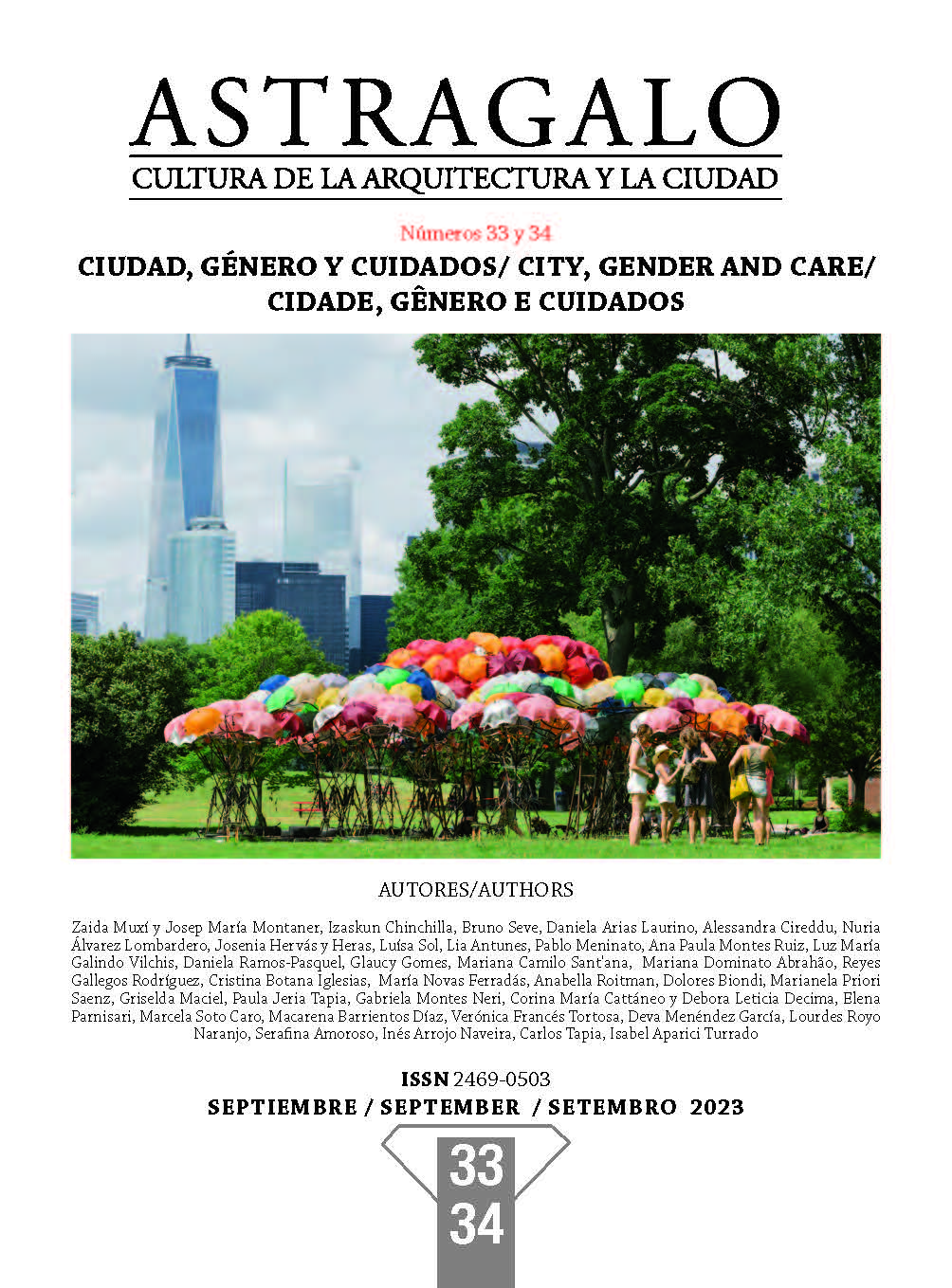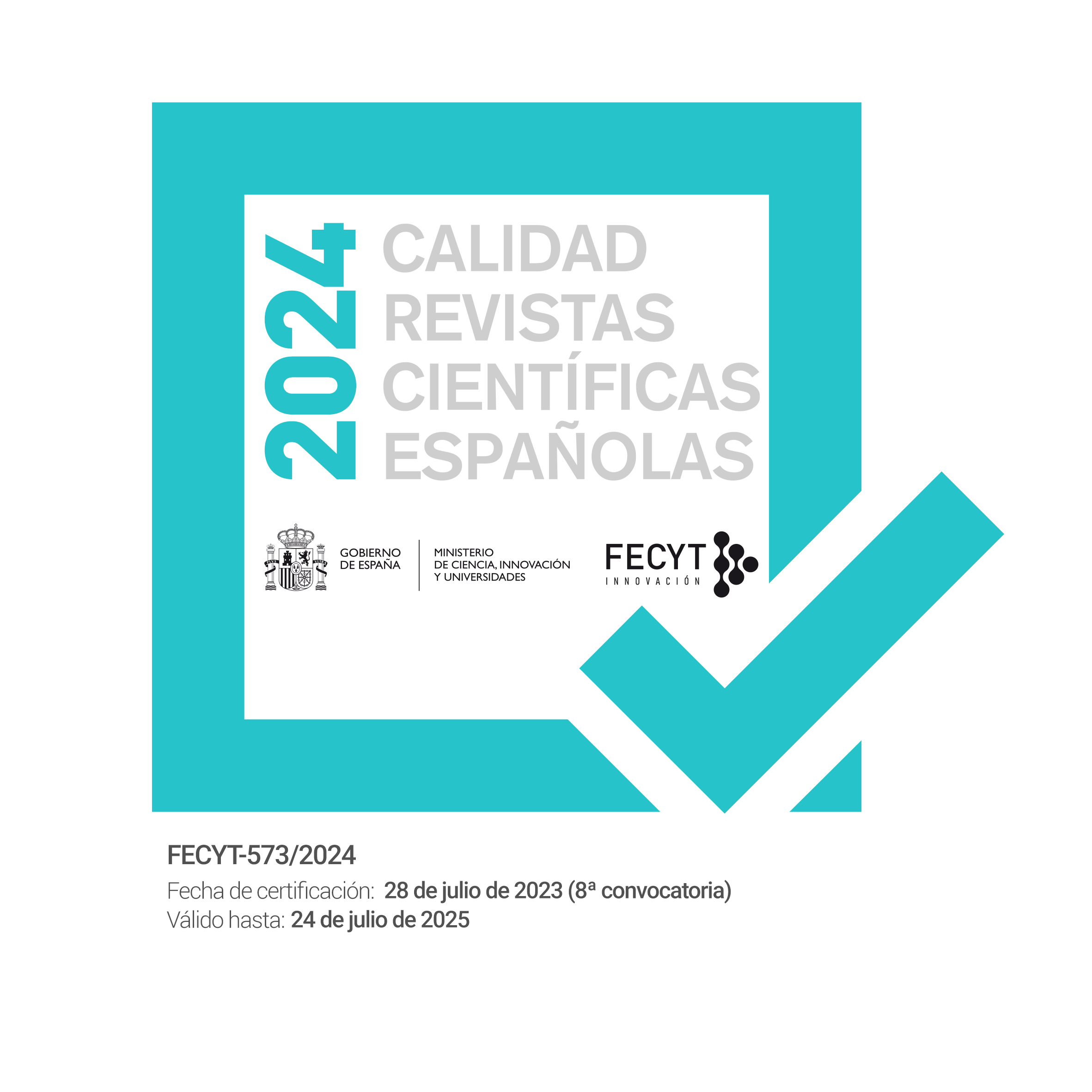Feminist urbanism: analysis of three urban projects of popular habitat in Latin America.
DOI:
https://doi.org/10.12795/astragalo.2023.i33-34.15Keywords:
feminist urbanism, popular hábitat, urban proyect, ecofeminism, caring cityAbstract
Feminist urbanism has promoted new forms of intervention in the design and management of the city, both from the public administration and from community initiatives, deploying good practices in different territories. This paper analyzes three cases of popular habitat urban projects in Latin America. It evaluates the roles of the people involved, the defined urban and building typologies and the forms of social organization adopted, verifying the degree of associativity to the theoretical ideas of Feminism and Care within urban planning. An individual signing of each case was carried out through 6 categories: Context, Objective, Actors, Strategy, Impact, and Features of Feminist Urbanism. We worked with a comparative matrix that allows relating them, detecting points in common and highlighting particularities, among others. The cases analyzed were the Intercultural Neighborhood “Comunidad de cambio” in San Martin de los Andes, Argentina; the Neighborhood “Alto Comedero” in San Salvador de Jujuy, Argentina, and the Neighborhood “Maestranza” in Santiago de Chile, Chile. The results obtained confirm the existence of a gender perspective in the planning, management and execution of each urban project, with particular features in each case, and allow us to affirm the effectiveness of the designed methodology. The projects promoted sociourban integration, the breadth of rights for women and diversities, as well as the intersectionality of the approaches that contemplated patrimonial aspects, historical reparations, environmental sustainability; cooperative work as a transformer of the territory, the prioritization of care policies and the questioning of gender roles in the distribution of tasks.
Downloads
References
Alonso del Val, Vega. 2020. “La pobreza tiene género”. Amnistía Internacional. Consultado el 10 de agosto del
https://www.es.amnesty.org/en-que-estamos/blog/historia/articulo/la-pobreza-tiene-genero/
Alvarado, Roxana. 2021. “Titulada de la Escuela de Postgrado gana Premio Aporte Urbano Mejor Proyecto
Integración Social 2021”. Facultad de arquitectura y urbanismo, Universidad de Chile. Consultado el
de mayo del 2023. https://fau.uchile.cl/noticias/182982/titulada-de-la-escuela-de-postgrado-
gana-premio-aporte-urbano-pau2021-
Buckingham, Shelley. 2011. “Análisis del derecho a la ciudad desde una perspectiva de género”. Revista de
derechos humanos 4: 6-12. https://www.corteidh.or.cr/tablas/r26773.pdf
Col Lectiu Punt 6. 2021. “Urbanismo feminista desde la participación y acción comunitaria”. Revista
notas. Consultado el 16 de agosto del 2023. https://www.revistanotas.org/revistas/49/2587-urbanismo-
feminista-desde-la-participacion-y-accion-comunitaria
Fernández Castro, Javier. 2011. “Las formas de lo informal. Elementos de lectura, proyecto y gestión
inclusiva desde la investigación proyectual.” IX Jornadas de Sociología. Facultad de Ciencias Sociales,
Universidad de Buenos Aires, Buenos Aires, 2011. https://cdsa.aacademica.org/000-034/863
García González, Luisa María. 2021. CUIdadanía, una posibilidad de reconstruir el cuidado como un acto político.
Universidad Nacional de Colombia Facultad de Ciencias Humanas y Económicas Medellín, Colombia.
Herrero, Yayo. 2013. “Miradas ecofeministas para transitar un mundo justo y sostenible”. Revista de
Economía Crítica 16: 278-307. https://www.avlaflor.org/wp-content/uploads/2016/12/09_YayoHerrero.
Marugán Pintos, Begoña. 2017. “La cuidadanía como eje de un nuevo pacto constituyente”. Cuadernos
Manuel Giménez Abad 5: 122-136. https://dialnet.unirioja.es/servlet/articulo?codigo=5811435
Miranda Gassull, Victoria. 2017. “El hábitat popular. Algunos aportes teóricos de la realidad habitacional
de sectores desposeídos”. Territorios 36: 217-238. https://doi.org/10.12804/revistas.urosario.edu.
co/territorios/a.4440
Pascual, Isabel. 2003. “No me imagino una agenda sin la inclusión de los derechos de las mujeres a la
ciudad»; lea entrevista a Ana Falú”. Plataforma global por el derecho a la ciudad. Consultado el 21 de
mayo del 2023. https://www.right2city.org/es/news/espanol-no-me-imagino-una-agenda-sin-lainclusion-
de-los-derechos-de-las-mujeres-a-la-ciudad-lea-entrevista-a-ana-falu/
Roitman, Anabella. 2020. Imbricación del urbanismo feminista en el planeamiento, la gestión y el proyecto
(Projecte Final de Màster Oficial) UPC, Escola Tècnica Superior d’Arquitectura de Barcelona, Departament
d’Urbanisme i Ordenació del Territori. ed.
Roitman, Anabella, Spinelli,Sofia, Poza, Cristina. 2020. Políticas públicas y urbanismo feminista. Alcances de
la implementación de la perspectiva de género en el planeamiento, la gestión y el proyecto urbano. Actas
de las Jornadas Anuales SI + Herramientas y Procedimientos, UBA - FADU, Buenos Aires. http://
repositoriouba.sisbi.uba.ar/gsdl/collect/actasfadu/import/2020/6.html
Tabbush, Constanza & Caminotti, Mariana. 2015. “Igualdad de género y movimientos sociales en la
Argentina posneoliberal: la Organización Barrial Tupac Amaru”. Perfiles latinoamericanos 46:
-171. https://www.redalyc.org/articulo.oa?id=11539199005
Ukamau. 2020. “Apertura Barrio Maestranza 1 de Ukamau: Ejemplo en la democratización de la ciudad,
una victoria de la organización y lucha popular”. Ukamau. Consultado el 20 de mayo del 2023.
https://ukamau.cl/2020/11/02/apertura-barrio-maestranza-1-de-ukamau-ejemplo-en-la-democratizacion-
de-la-ciudad-una-victoria-de-la-organizacion-y-lucha-popular/
Valdivia, Blanca. 2018. “Del urbanismo androcéntrico a la ciudad cuidadora”. Revista Hábitat y Sociedad
: 65-84. http://dx.doi.org/10.12795/HabitatySociedad.2018.i11.05
V. Valiña, Carmen. 2019. “Interseccionalidad: Definición y Orígenes”. PeriFéricas, Escuela de feminismos
alternativos. Consultado el 10 de agosto del 2023. https://perifericas.es/blogs/blog/interseccionalidad-
definicion-y-origenes
Vecinos sin techo. 2016. “Diseño participativo”. Vecinos sin techo, Blogspot. Consultado el 21 de mayo del
http://vecinossintecho.blogspot.com/p/diseno-particpativo.html
Downloads
Published
How to Cite
Issue
Section
License
Copyright (c) 2023 Anabella Roitman, Marianela Priori Saenz, Dolores Biondi, Paula Jeria Tapia, Griselda Itatí Maciel

This work is licensed under a Creative Commons Attribution-NonCommercial-ShareAlike 4.0 International License.


















